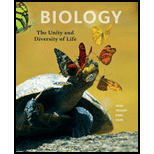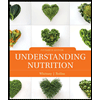
Concept explainers
The expression of a gene may depend on _______.
- a. the type of organism
- b. environmental conditions
- c. the type of cell
- d. all of the above
Concept introduction: Genes are the fundamental units of heredity, which are composed of DNA. Each gene specifies a particular protein. For this, the genes will be converted into a useful product through the process of gene expression. Gene expression involves the conversion of DNA into RNA through the process of transcription. Then, this RNA will be converted into proteins through the process of translation.
Answer to Problem 1SQ
Correct answer: The expression of a gene may depend on the type of organism, environmental conditions and the type of cell.
Therefore, option d. is correct.
Explanation of Solution
Reason for the correct statement:
The gene expression depends upon many factors including the type of organism, environmental conditions and the cell type.
Based upon the type of organism (simple and complex) the gene expressions vary.
Every cell has its own environmental conditions which contain the proteins. Depending upon the location of each of these proteins, the gene expressions may vary.
There are many types of cells that perform different specialized functions. Each cell will adjust to the metabolism by adjusting the gene expression. Also, the multicellular organisms will modify their body structure and function by regulating the gene expression.
Hence, option d. is correct.
Reasons for the incorrect statements:
Option a. is given as, “the type of organism”.
The organisms can be simple or complex depending upon their physiology and anatomical organization. Based upon the type of organism, the gene expressions vary. The given option is correct but the gene expression also depends upon the environmental conditions and the type of cell.
Hence, option a. is incorrect.
Option b. is given as, “environmental conditions”.
Every cell has its own environmental conditions (extracellular and intracellular conditions) which contain the proteins. Depending upon the location of each of these proteins, the gene expressions may vary. The given option is correct but the gene expression also depends upon the type of organism and the type of cell.
Hence, option b is incorrect.
Option c. is given as, “the type of cell”.
There are many types of cells that perform different specialized functions. Each cell will adjust to the metabolism by adjusting the gene expression. The given option is correct but the gene expression also depends upon the environmental conditions and the type of organism.
Hence, option c. is incorrect.
Hence, options a., b., and c. are incorrect.
Want to see more full solutions like this?
Chapter 10 Solutions
Biology: The Unity and Diversity of Life (MindTap Course List)
- What is behavioral adaptarrow_forward22. Which of the following mutant proteins is expected to have a dominant negative effect when over- expressed in normal cells? a. mutant PI3-kinase that lacks the SH2 domain but retains the kinase function b. mutant Grb2 protein that cannot bind to RTK c. mutant RTK that lacks the extracellular domain d. mutant PDK that has the PH domain but lost the kinase function e. all of the abovearrow_forwardWhat is the label ?arrow_forward
- Can you described the image? Can you explain the question as well their answer and how to get to an answer to an problem like this?arrow_forwardglg 112 mid unit assignment Identifying melting processesarrow_forwardGive only the mode of inheritance consistent with all three pedigrees and only two reasons that support this, nothing more, (it shouldn't take too long)arrow_forward
- Oarrow_forwardDescribe the principle of homeostasis.arrow_forwardExplain how the hormones of the glands listed below travel around the body to target organs and tissues : Pituitary gland Hypothalamus Thyroid Parathyroid Adrenal Pineal Pancreas(islets of langerhans) Gonads (testes and ovaries) Placentaarrow_forward
 Biology: The Unity and Diversity of Life (MindTap...BiologyISBN:9781305073951Author:Cecie Starr, Ralph Taggart, Christine Evers, Lisa StarrPublisher:Cengage Learning
Biology: The Unity and Diversity of Life (MindTap...BiologyISBN:9781305073951Author:Cecie Starr, Ralph Taggart, Christine Evers, Lisa StarrPublisher:Cengage Learning Concepts of BiologyBiologyISBN:9781938168116Author:Samantha Fowler, Rebecca Roush, James WisePublisher:OpenStax College
Concepts of BiologyBiologyISBN:9781938168116Author:Samantha Fowler, Rebecca Roush, James WisePublisher:OpenStax College Biology Today and Tomorrow without Physiology (Mi...BiologyISBN:9781305117396Author:Cecie Starr, Christine Evers, Lisa StarrPublisher:Cengage Learning
Biology Today and Tomorrow without Physiology (Mi...BiologyISBN:9781305117396Author:Cecie Starr, Christine Evers, Lisa StarrPublisher:Cengage Learning Understanding Nutrition (MindTap Course List)Health & NutritionISBN:9781337392693Author:Eleanor Noss Whitney, Sharon Rady RolfesPublisher:Cengage Learning
Understanding Nutrition (MindTap Course List)Health & NutritionISBN:9781337392693Author:Eleanor Noss Whitney, Sharon Rady RolfesPublisher:Cengage Learning





